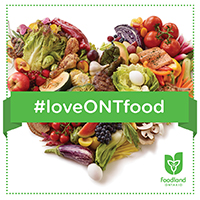Sustain Responds to the Local Food Report
Posted: June 17, 2016
Categories: Food in the News / News from Sustain Ontario
Progress updates on Ontario’s Local Food Strategy released in this year’s Local Food Report!
Four major achievements in the agri-food sector are highlighted:
- 175 farmers’ markets are now registered with Farmers’ Markets Ontario
- The Ontario Farm Fresh Marketing Association boasts nearly 300 members, and this number continues to rise
- 81 per cent of Ontario shoppers can identify Ontario-grown fruits and vegetables in grocery stores
- 52 per cent of principal grocery shoppers in Ontario include locally grown food in at least one meal per day while 78 per cent eat local food at least once per week
Ontario’s Local Food Strategy
Ontario’s local food strategy is built on three pillars:
- Consumer awareness and education: Ontario consumers are aware of, value and choose more local foods.
- Access to local food: Local food is identifiable and widely available through a range of distribution channels.
- Sufficient supply: Ontario’s agri-food sector is competitive, productive and responsive to consumer demand.
Sustain Ontario endorses these vital pillars to growing a strong and sustainable agri-food sector in Ontario. As the report highlights, Local Food Champions are a crucial ingredient to increasing local food education and access. Among several other programs and initiatives, Sustain Ontario’s Local Food Procurement Toolkit was cited as a successful means to help municipalities and institutions create local, sustainable procurement policies and programs.
Evaluating Ontario’s Local Food Strategy
2015 was the year to increase consumer awareness and education around local food. The provincial government invested millions of dollars in local food projects from grocery store initiatives to school programs and was highly successful in achieving this goal. According to the report: 81% of Ontario shoppers can identify Ontario-grown fruits and vegetables in grocery stores.
For 2016, the focus shifted to increasing access to local food. The report identified increasing numbers of on and off-farm markets, community supported agriculture (CSA’s), and roadside stalls. While Sustain Ontario endorses the progress that the government is taking to increase access to local food, there is still along way to go. Sustain has drafted a list of proposed recommendations to help foster increased access to local food.
Recommendations:
- Including specific targets would allow new and current activities to be measured and evaluated. An annual report card, measuring each year’s achievements against these benchmarks would benefit everyone’s work to support a strong local food economy.
- Supporting farmers is a crucial part to increasing access to local food. Farmland preservation, and increased programs (such as the Artisanal Chicken Program) help small-scale local farmers provide quality local produce.
- Identifying barriers to local food, including financial constraints, could enable the government to understand individual obstacles and develop strategic solutions.
- Supporting programs that help socially and economically marginalized communities increase their access to healthy local food is one potential way the Local Food Fund could address financial constraint barriers.
Celebrate Ontario’s Local Food Champions!
The report featured select local food champions that are helping to drive growth in the Ontario agri-food sector. Sustain congratulates the local food champions highlighted: Farm & Food Care Ontario; Algoma Food Network; Ontario Agri-Food Venture Centre; Greenbelt Fund; Fresh from the Farm; Purvis Brother’s Limited; Joshna Maharaj, renowned local food activist; Steffen Marin, owner of the Heirloom Farm to Truck; and Brian Fernandez, the condiment crusader.
The report also showcased projects and initiatives supported by The Local Food Fund that helped grow small businesses across Ontario. Community food donation programs were also commended for providing fresh, local food to families in need.
One of the purposes of the Local Food Act is to ‘foster successful and resilient local food economies and systems throughout Ontario‘. In support of this objective, it is recommended that the province set clear targets that have been collaboratively developed and agreed upon and that a rubric be created to help set and achieve these goals. Benchmarks also should be used as a progress indicator.
As Carl Heinrich, Chef/Co-Owner of Richmond Station and Top Chef Canada Season 2 winner states:
“There is an incredible amount of delicious, locally grown and locally made food available right here in Ontario. We all want to buy food that is more sustainable, and cash flow is an important ingredient in every farmer’s sustainability. By choosing to spend our dollars on local food and beverages, we can help make buying local more sustainable for everyone.”
Increasing access of local food doesn’t necessarily just mean increasing the number and frequency of markets, it also means addressing the issue of financing our food shed, both providing fair prices to farmers and providing fair prices to consumers so that all Ontarians, regardless of income, can access to fresh local food.
One response to “Sustain Responds to the Local Food Report”
Leave a Reply
You must be logged in to post a comment.


[…] Read more about the Local Food Act! […]